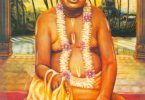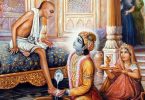Question: What are the rules for Ekadasi fast? Can children and unmarried girls also observe this fast? How should one fast – is it completely fasting, even from water, or in some other way. Please explain.
Answer by Romapada Swami: Ekadasi is a very auspicious day, and is called Hari-vasa or the day for remembering Lord Hari (or Krishna). Most important on this day is to increase one’s spiritual activities, such as increasing ones’ chanting of God’s holy name, and discussing Krishna katha. On the side of restraint, on should minimize as much as possible one’s eating and sleeping and other mundane engagements.
Ekadasi fast requires that one minimally refrains from grains and beans, strictly. It is very good if one can observe full fasting, even from water, until the daybreak hours of the next day (there are details for this timing, for which you can consult your nearest ISKCON temple to find out the local timings); however, those who are unable to observe a full fast can take water, or fruits, etc., in different gradations of fasting, but they must strictly refrain from grains and beans. Those who eat grains and beans on Ekadasi are considered to be eating sin, because Sin Personified resides in grains on that day. Overall, the general principle of Ekadasi fast is to reduce our normal level of eating, because such determined performance of austerities on the auspicious Ekadasi day helps us to control our senses, increases our determination for devotional service, and quickly purifies our hearts. Such devotional austerities are very pleasing to Krishna.
Everyone, including children and unmarried girls can, and in fact are recommended to, observe Ekadasi. Even if they are unable to fast completely, they should fast from grains and beans, and engage in increased devotional activities on that day.







